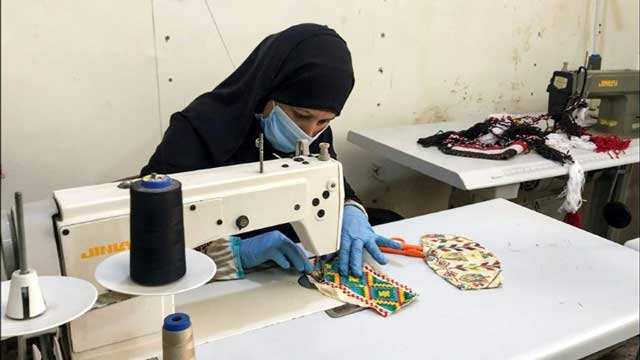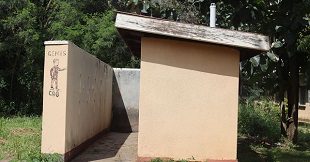
Cairo, Egypt | AFP | In El-Arish, the provincial capital of Egypt’s North Sinai, a group of women sew colourful Bedouin designs on masks to combat coronavirus, as an insurgency simmers in their restive region.
Egypt’s toll from the COVID-19 pandemic has reached over 28,600 cases, including more than 1,000 deaths, while North Sinai itself remains the bloody scene of a long-running Islamist insurgency.
“I learnt how to embroider when I was a young girl watching my mother,” homemaker Naglaa Mohammed, 36, told AFP on a landline from El-Arish, as mobile phone links are often disrupted.
A versatile embroiderer, she also beads garments and crafts rings and bracelets.
Now with the pandemic, she has been designing face masks showcasing her Bedouin heritage.
Bedouins are nomadic tribes who traditionally inhabit desert areas throughout the Arab world, from North Africa to Iraq. Many have now integrated into a more urban lifestyle.
Egypt’s Bedouin textile tradition of tatriz — weaving and beading rich geometric and abstract designs on garments, cushions and purses — has been passed down from generation to generation for centuries.
It has survived in the Sinai Peninsula, whose north has been plagued by years of militant activity and terror attacks spearheaded by a local affiliate of the Islamic State (IS) group.
– Keeping Bedouin heritage alive –
Security forces have been locked in a battle to quell an insurgency in the Sinai that intensified after the military’s 2013 ouster of Islamist president Mohamed Morsi.
In February 2018, authorities launched a nationwide operation against militants, focusing on North Sinai.
Around 970 suspected militants have since been killed in the region along with dozens of security personnel, according to official figures.
Local and international media are banned from entering heavily militarised North Sinai.
But for Amany Gharib, who founded the El-Fayrouz Association in El-Arish in 2010, the violence has not dissuaded her from keeping Bedouin heritage alive while at the same time empowering local women.
She now employs around 550 women like Mohammed — many of them casually or part-time — as part of a textiles workshop.
“The masks are composed of two layers — one inner layer directly on the face which is disinfected, and the colourful, beaded one outside,” Gharib explained to AFP.
All the women take the necessary precautions while working, including wearing gloves and masks while using sewing machines.
The finished products are washed, packed and shipped off to distribution centres in Cairo, where they are sold online in partnership with Jumia — Africa’s e-commerce giant — for about 40 pounds ($2.50) each.
The beading process takes about two days for each mask, Gharib said.
– Living with terror –
Amid the volatile security situation, Mohammed has been able to eke out a meagre living with her embroidery skills.
“We work and are given our dues depending on the orders we get… with the masks it has been a new challenge we’ve tackled,” she said.
Dire economic conditions in Egypt have been even tougher for women of the Sinai since the pandemic began.
“Times are really tough for the women but we have adjusted,” Gharib said.
And while militant attacks on security checkpoints have continued, Gharib expressed confidence in the army.
“We feel a sense of security and stability with the military presence. We trust them,” she said.
The region witnessed the deadliest terror attack in Egypt’s modern history when militants killed more than 300 worshippers in a mosque in November 2017.
Gharib said that in North Sinai’s tight-knit community, each family knew someone who had been killed in an attack.
“Anyone of us who is killed, we consider them a martyr,” she said.
“We are in a war with terror… but the people have learnt to live with it.”
 The Independent Uganda: You get the Truth we Pay the Price
The Independent Uganda: You get the Truth we Pay the Price


